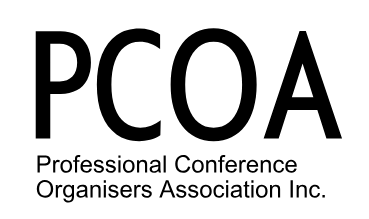Code of Conduct
Members of the Professional Conference Organisers Association are required to operate in accordance with the Association’s Code of Professional Conduct.
The Code of Professional Conduct has been created so that members provide a level of service and ethical practice that gives confidence to their clients and suppliers.
The Association is committed to developing and maintaining high levels of respect and trust for members and in so doing to ensure a high level of respect and trust for the conference and meetings section of the events industry.
Preamble
Members will maintain high standards of personal and professional conduct, including:
- Complying with the laws of Australia or New Zealand or the country in which their work is performed, operating within the spirit of those laws and acting honestly and fairly in all business dealings.
- Ensuring that their contracts and/or terms of business are clear, concise and honoured in full, unless terminated or amended by mutual consent.
- Develop and maintain high levels of personal competence through a commitment to ongoing professional development.
- Ensuring that their employees and work colleagues develop and maintain high levels of personal competence through a commitment to ongoing professional development.
Operating Practices and Principles
The following principles must be observed by Members.
Members must:
- Maintain a high professional standard when dealing with clients and others.
- Act with integrity and honesty in all business dealings and with colleagues and employees.
- Not make any false or misleading statements in order to obtain business, or about their competitors.
- Members must strive to represent their/their clients events to prospective venues in fair and realistic frameworks, hence minimizing unrealistic holdings of space and room nights.
- Declare immediately any real or potential conflict of interest with any client, supplier or subcontractor.
- Maintain accurate records of all dealings in relation to the delivery of events and meetings.
- Comply with all consumer laws as they relate to the sector.
The following practices are required of Members and the companies they own or manage.
Members must:
- Provide a safe and healthy work environment for employees and subcontractors prior to and during events and meetings.
- Members must pay staff fairly to at least minimum award standards and conditions within the state in which they are operating, adhering to Fair Work Australia guidelines.
- Prior to entering into an agreement with a Client, ensure that the Client understands the business model to be utilised in the contact ie, Principal, Agent, Profit Share etc and the potential positives and negatives of each business model.
- When acting as an agent of the Client, keep separate accounting records for each Client.
- When acting as an Agent of the Client, reconcile the Client accounts periodically and provide updated reports to the Client.
- Never use Client’s funds for your company operating expenses.
- Fully disclose to clients all charges and commissions in accordance with relevant federal and state laws, including laws pertaining to Secret Commissions.
- Endeavour to ensure that clients and potential clients are fully informed regarding the basis for charging fees and other costs and will not do anything which might intentionally mislead a client regarding the basis for such charges.
- Maintain public liability and professional indemnity insurance cover appropriate to the work being undertaken.
- Enter in written contracts or agreements that clearly describe:
- the work to be undertaken
- the roles and responsibilities of all parties
- the payment terms and conditions
- the ownership of intellectual property
- provisions relating to the maintenance of client confidentiality
- dispute resolution provisions designed to avoid court proceedings
- Not injure or attempt to injure, maliciously or recklessly, the professional reputation of others.
- Respect the confidentiality of information which comes to them in the course of their duties.
- Not intentionally mislead Clients when preparing tender documents.
